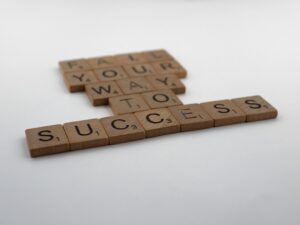Have you ever felt like your brain is running on dial-up in a 5G world?

I’ve been there. For years, I felt stuck in a fog. My days were a blur of gaming, binge eating, and just feeling lazy and unmotivated. My mind felt slow and my focus was shot. I knew I needed a change but the idea of a total life overhaul was just too overwhelming. I thought real change was for other people. It turns out I was wrong. The journey to a clearer mind and a better life started with small, simple steps that anyone can take.
I managed to break free from those habits, lose over 110 pounds, and build a life that feels purposeful. It wasn’t a single magic bullet. It was a collection of small changes that added up over time. Today, I want to share the techniques that helped me clear the mental clutter and feel sharp again.
It All Starts with the Foundation
You can’t build a strong house on a weak foundation. The same is true for your mind. Before you try any fancy brain-training apps or complex systems, you have to get the basics right. Your brain is a physical organ and it needs physical care.
I learned this the hard way. When I was overweight and eating poorly, my thinking was sluggish. I had trouble concentrating and my mood was always low. Cleaning up my diet and getting my body moving wasn't just about weight loss. It was about giving my brain the fuel it needed to function. It’s amazing how much clearer you can think when you’re not fighting against a body bogged down by junk food and inactivity.
The Power of a Simple Routine
Most people think productivity means grinding for eight hours straight. That’s a recipe for burnout. I discovered that I get my best work done in short, focused bursts. My sweet spot is about two to four hours of deep, uninterrupted work. The rest of the day is for lighter tasks, exercise, and rest.
Building a routine gave my brain a roadmap for the day. It reduced decision fatigue because I already knew what was coming next. This structure didn't trap me. It freed me. It freed up mental energy that I used to waste on figuring out what to do next.
Here are 30 practical techniques that have made a world of difference for me. Don’t feel like you have to do them all at once. Just pick one or two that feel right and start there.
- Get Quality Sleep. Aim for 7–9 hours. It’s non-negotiable for brain health.
- Hydrate. Your brain is mostly water. Drink plenty of it throughout the day.
- Eat Real Food. Focus on foods rich in omega-3s (like fish), antioxidants (like berries), and vitamins.
- Move Your Body. A simple walk can boost blood flow to the brain and improve your mood.
- Get Some Sunshine. A little sun exposure helps your body produce Vitamin D which is crucial for brain function.
- Cut Down on Sugar. Sugar causes inflammation and energy crashes which leads to brain fog.
- Do One Thing at a Time. Multitasking is a myth. It just splits your focus and makes you less effective.
- Take Regular Breaks. Step away from your screen every hour to rest your eyes and mind.
- Read a Book. Reading stimulates your mind and introduces you to new ideas.
- Write by Hand. It forces you to slow down and process information differently than typing.
- Listen to a Podcast. Turn your commute or chores into a learning opportunity.
- Watch a Documentary. Learn something new about the world in a visual and engaging way.
- Learn a New Skill. Try learning a language or a musical instrument. It builds new neural pathways.
- Play Brain Games. Puzzles like Sudoku or crosswords challenge your logic and memory.
- Declutter Your Space. A tidy environment leads to a tidier mind.
- Plan Your Day the Night Before. This reduces morning anxiety and sets you up for success.
- Embrace a Growth Mindset. Believe that your intelligence and abilities can be developed.
- Challenge Negative Thoughts. When a negative thought pops up, question its validity. Is it actually true?
- Practice Active Listening. When talking to someone, truly listen instead of just waiting for your turn to speak.
- Teach Someone Else. The best way to learn something is to teach it.
- Celebrate Small Wins. Lost one pound? Finished a difficult task? Acknowledge it. It builds momentum.
- Practice Daily Gratitude. Take a moment each day to thank God for your blessings big and small.
- Limit Social Media. Constant scrolling and comparison can drain your mental energy.
- Listen to Instrumental Music. Classical or ambient music can help improve focus while you work.
- Ask “Why?” Five Times. To understand a problem deeply, keep asking why until you get to the root cause.
- Daydream Productively. Let your mind wander with a specific problem in mind. You might be surprised by the solutions that surface.
- Do Something Creative. Draw, paint, write, or build something. It engages a different part of your brain.
- Spend Time in Nature. A walk in the park or a hike in the woods can reset your mind.
- Connect with Others. Meaningful conversations and relationships are vital for mental well-being.
- Pray. Connect with God. Hand over your worries and ask for guidance.
The Ultimate Cognitive Enhancer
Out of all these techniques, one stands above the rest. It’s the one that gives context and purpose to everything else. For me, that has been strengthening my faith.
When I was lost in my addictions, I felt like I was fighting alone. I was trying to fix myself with my own broken tools. It was exhausting. Turning back to God and strengthening my Christian Orthodox faith gave me a foundation that I could build on. Prayer wasn't just a routine. It became a conversation. Reading scripture wasn't just a task. It became a source of wisdom and peace.
My faith gave me a "why." It gave me a reason to get healthy, to be productive, and to treat my mind and body with respect. It taught me that I am not defined by my past mistakes but by the grace I’ve been given. This clarity of purpose is the most powerful cognitive enhancer I’ve ever found. It directs your focus, calms your anxieties, and gives you strength when your own willpower runs out.
You don’t have to climb the whole mountain today. You just have to take the first step. Look at this list again and find one thing. Just one. Something that feels small and manageable.
What is one small change you can make today to start clearing the fog?





